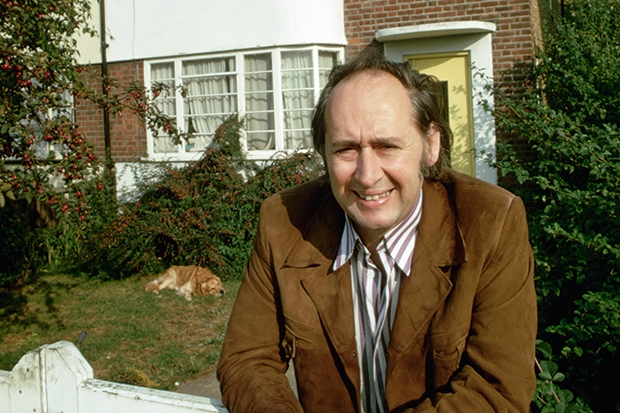That cinema is having another Ballardian moment will surprise few fans. J.G. Ballard, who died of cancer in 2009 at the age of 78, was one of the darkest, most unsettling of post-war British novelists. In a career that spanned half a century from his debut as a science-fiction writer in the mid-1950s, his surreal imagination confronted such subjects as nuclear catastrophe and planetary drought. His discomfiting novel Crash (1973) attributed a deviant sexuality to the road accident. Ballard had a taste for ‘automobile pornography’, according to his biographer John Baxter, and fantasised about having sex with Margaret Thatcher in the back of the prime-ministerial Daimler V8.
In 1991, I called on Ballard at his home in Shepperton off the M3, where he had lived for 30 years. Shepperton had been attacked by Martians in The War of the Worlds, and in his fiction Ballard often tried to complete the task that H.G. Wells had begun. (His last published novel, Kingdom Come, unfolded amid the tarmac flyovers and underpasses that ring Heathrow and Thames Valley suburbia.) Immensely courteous, Ballard poured extravagant measures of whisky and spoke, among other things, of his love of surrealist art. His imaginary landscapes, influenced by the surrealist painters Giorgio de Chirico and Max Ernst, remain among the most haunting in English literature; the term ‘Ballardian’ has now entered the language. We became friends. Ballard sent me photographs of his cat and postcards of paintings by the Belgian painter Paul Delvaux. In the Telegraph, to my delight, he reviewed a book I wrote on Haiti (‘Perhaps you should seriously think about writing a novel?’), and helped research my biography of Primo Levi. He was extremely kind and generous.
High-Rise, Ballard’s great 1975 dystopia of London tower-block madness, has now been turned into a film starring Tom Hiddleston, Sienna Miller and Jeremy Irons. A Wellsian drama of extremity and isolation, the film explores the rat-like behaviour of human beings trapped amid the concrete walls of an elegant 40-storey high rise. Petty disputes between neighbours turn into battles for control of the lifts and stairwells, as the once-luxurious amenities become an arena for technological mayhem. Hiddleston, in the role of the suavely suited Dr Robert Laing, lives on the 27th floor beneath the super-rich at the top and the merely well-off on the lower floors. As Ben Wheatley’s disconcertingly glacial film progresses, the tower-block inhabitants retrogress into ever more violent hunter-gatherer enclaves. ‘Let the psychotics take over,’ declares a character. The London apartment building, in Ballard’s distempered vision, is the blueprint for all coming violence, which will be increasingly pointless.
His wayward architectural dystopia had its origin in deep-rooted personal trauma. Born in 1930 in Shanghai into a privileged semi-colonial family (his father was a textile manufacturer), the schoolboy Jim saw his world collapse when the Japanese invaded and he was deported with his parents to Lunghua, a civilian prison camp. There, Ballard’s existence became increasingly brutal and illogical: he learnt that human life can be expendable and brief. (For want of food, he ate weevils. ‘They contain protein,’ his father urged.) The sense of deprivation was compounded years later by the shocking early death of his wife Mary from viral pneumonia during a family holiday in Spain in 1964. High-Rise, like all Ballard’s fiction, was informed by the tragedy. Ballard brought up his three children alone, writing in his Shepperton semi-detached house while they were at school.
Few novelists found poetry in concrete urban architecture: Ballard could. He loved the glittery embrace of modernity and considered Michael Manser’s space-age Heathrow Hilton the ‘most exhilarating building in the British Isles today’. High-Rise, with its hard-edged images of abandoned car parks and drained swimming pools, is a resolutely earthbound fantasy. No British writer did more to release science fiction from the scaly stranglehold of interstellar travel and the green humanoids of American pulp magazines. ‘The only truly alien planet is Earth,’ Ballard told me.
As a new social order evolves in the ‘vertical city’, so the residents form a powerhouse of infantile aggressions and class antagonisms. The architect who designed the tower block, Anthony Royal (played by Jeremy Irons), had not foreseen the drama of confrontation between advertising executives, stock-exchange jobbers and other disaffected metropolitans. From his penthouse eyrie he can only wonder at the undermining of civilised conventions. J.G. Ballard, the only surrealist resident in Shepperton, was a moralist troubled by the shape of things to come.






Comments